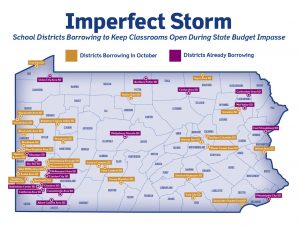Sometime in the next few months Governor Wolf will celebrate his first year in office. Hopefully we will have a budget deal well before then. If not, it will be a somber celebration. Every day more social service organizations that rely on state funding are forced to cut services. And Pennsylvania’s poorer school districts will soon have a problem meeting payroll.
The Governor rejected the Republican strategy of a temporary stopgap budget based on last year’s budget. A stopgap would buy time for local organizations and school districts. But Wolf wanted to keep the pressure on to get a deal, fearing that what is temporary could become permanent. You do not have to look any further than Washington D.C. to understand his perspective.
A rejection of a stopgap budget may, however, backfire politically if nothing gets resolved soon, particularly if the Governor eventually has to give in and accept the temporary accord. That will get many local officials to wonder what the waiting game was all about. After all, service organizations, local government, and school districts are losing money now as they take on more debt to manage liquidity.
Today the locals are sending money to the state but getting nothing back. This cannot go on much longer without significant political consequences. County commissioners, mayors, school boards, and service groups are increasingly speaking up and they are not happy. They are left to manage a mess that is not of their making.
Moreover, the credit ratings and pension fund liabilities for the state continue to deteriorate which makes overall costs go up for state and local government. At a time of national economic uncertainty reflected in a stock market that has lost 5 percent of its value over the past few months, it is hard to imagine a more irresponsible politics than what we are seeing in Harrisburg.
Ten months in, the major accomplishment of Gov. Wolf is his rhetorical support for more money for schools. Otherwise it’s an administration that’s waiting to begin.
When H.L. Mencken noted that a good politician is quite as unthinkable as an honest burglar, he may have had visions of Harrisburg in 2015. This is not what Pennsylvania needs from its political class. But this is what we have and there is blame to go around, even if you favor one side’s position over the other.
The core leadership deficit on both sides is not their inability to challenge the other side with ideas and numbers or articulate their own positions and rationale: that is the easy part of politics.
The leadership deficit is a function of the fact that neither side seems capable of challenging itself. And that simply will not work in a situation where there is absolute equality of power. With complete power equality, the inability to get out of your own way creates the (bipartisan) circular firing squad.
Today we need leadership in Harrisburg capable of reasoning past its own assumptions. This is the only way to build scenarios that lead to a settlement. Of course most of that will happen behind closed doors. But right now there is no evidence that either the Governor or the legislative camps are able to lead in such a transformative way.
Political compromise generally requires starting with points of agreement and then arbitrating more divisive issues. It requires champions on both sides of the aisle willing to step further to the center than their party faithful are willing to go. It takes time and patience and the champions have to be, at least nominally, sanctioned by respective political leaders.
The best champions possess four attributes: a belief that governance is central to their job description; the acceptance that others sincerely believe differently than they do; a recognition that everyone has constituents to which they have to answer; and the humility to believe that they do not have all the answers.
Right now it is hard to find any champions willing to cross party leadership lines. They are captive to a drama that seems beyond their control. When everyone fully believes his or her rhetoric it is hard to move anything forward.
Some in Harrisburg are beginning to view Gov. Wolf as a political dilettante more than a capable leader.
The drama began with last March’s budget announcement that was bold in its spending assumptions and tax strategy. But it was dead on arrival because it gave the Republicans virtually nothing they wanted—and they control the legislature.
That approach is fine if you have a political strategy to build a governing majority or you use the opening budget announcement as a negotiating position that leads to an end product. But it is hard to identify any strategic intention outside of the basic pronouncements: This budget is the right one for Pennsylvania; I won the election, so pass it.
Wolf did give the Republicans a net corporate tax reduction that they and he wanted but that was it. His budget stressed more money for education and services but had very little reform language of the kind that might appeal to Republicans. It was a budget address for a Democratic majority legislature, which runs counter to the reality of the situation.
On the Republican side, their declarations about the budget leave little room for compromise. They are adamant about taxes and will only move on increased spending if it is accompanied by structural reforms. But it is hard to see their math adding up in the budget they sent to Governor Wolf in June, which he naturally vetoed as inadequate.
The Republican political advantage is that a temporary budget gives them a no tax increase victory in the short term. The three things the Republicans want are no new taxes, significant changes in the state pension fund, and liquor store privatization. The Governor’s budget gave them none of those.
To his credit since the budget announcement, Wolf has offered compromise proposals including changes to his tax plan, some pension fund reforms, and a new idea on liquor stores. And he can argue, with some credibility, that the Republicans have not responded with significant counter proposals.
Yes, the Republicans have moved closer to Wolf’s number on school funding but they have been intransigent on taxes, which makes their credibility as a negotiating partner suspect.
In the recent vote on taxes in the House, the Governor’s revenue agenda was defeated without one Republican defection but with nine Democrat defections. Governor Wolf cannot afford to lose the confidence of legislators within his own party. Some of them privately wonder about his political strategy: as in, does he have one?
The Democrats agree with the substance of his budget but they do not see an endgame. Why even push for that vote if you could not count on any defections from the Republicans? And why talk about the vote as if you won something? The craft of politics is counting votes. It is a craft that Wolf must learn in a hurry. You cannot govern by commandment in a perfectly divided government.
Both the Governor and the Legislature (currently on break) seem oddly detached from the crisis. Nobody is really listening to the respective talking points. The talking points are old. It is time for the legislators on both sides to have a talk with their own leadership and members.
On the Republican side they need to come to terms with the fact that some additional tax revenue will be required, including a gas tax. If you think Wolf’s changes in the tax code are too high, make counter proposals. Moreover, come to terms with the fact that even significant changes in the pension fund system or the state stores will provide no magical panacea in the short term. Both can contribute to fixing the structural deficit, but will not resolve it tomorrow.
Wolf’s unwillingness to explain to his public union allies the importance of a credible long-term strategy on pensions is contrary to what any governor should be doing at this time. We have a contractual obligation with public workers but if we do not clean up the gimmicks and reform the system, the situation will worsen for taxpayers and workers alike. Wolf’s own pension proposal is sorely lacking, something that major newspaper editorial boards have not examined.
And does Wolf really want a Waterloo moment around the existence of a state liquor store system that has the feel of a 1950’s Soviet retail shop? He wants to protect the union jobs and I appreciate that. But there are good proposals out there that can lead to an orderly privatization and protect workers over a transition period. Let’s start working on those.
As the stalemate continues, one wonders who will take the biggest political hit. While the last reliable poll (the end of August) blamed Republican legislators over the Democratic Governor, Wolf’s overall favorability rating has been in decline. Quinnipiac has him at a 41% approval, down 6% since the budget battle began. Still not bad given the situation but if his ratings fall much further, there will be reason to worry only one year into his term.
Wolf’s unwillingness to explain to his public union allies the importance of a credible long-term strategy on pensions is contrary to what any governor should be doing at this time.
Almost 10 months into his first year the major accomplishment of the Governor is his rhetorical support for securing more money for schools. Otherwise it is an administration that is waiting to begin. And if the Republican legislature has its way, it may wait for a very long time.
This could all change overnight when the budget is passed but that will depend on what the final document looks like and how his supporters view it. Will Wolf get credit for holding out in a long battle with the Republicans or will the compromises that he will inevitably have to make create a backlash from supporters?
The Governor is a bright and capable man who successfully turned around his family business. He is no lightweight when it comes to big ideas or his understanding of technical issues. He studies hard and works hard. He knew what he was up against. He is, as he likes to say, no ordinary politician. But it is now time to wonder whether that is, at least, a part of the problem. He is not showing any political skill from hiring a chief of staff who leaves after only six months (something he was privately furious about) to placing overly ideological staff into the negotiating room.
Some in Harrisburg are beginning to view him as a political dilettante more than a capable leader. Candidate Wolf projected a compelling populist narrative: the non-politician, the fighter for the middle class, the guy who would restore education budget cuts by the Republicans, the businessman who would go after the gas companies that have gotten away without paying their due.
But his campaign also projected another narrative: He was a loner or as one person recently suggested to me, a bit of Mr. Smith Goes to Washington. But this is not a Frank Capra film. It is Harrisburg. And in Harrisburg in 2015 you can only win by building coalitions and offering bipartisan deals. Otherwise there will be no sequel.




